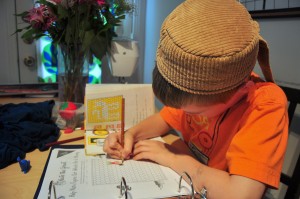As a parent, one of the many things we need to teach our children, is how to fail. This is difficult to do, especially when you’re a competitive and semi-perfectionist mother.
In my pre-teens, I was one of those who cheated in games whenever possible to win. I got mad when I felt like I was losing in a game. I refused to play another if I lost and sulked about for a while. I latched onto silly “superstitious” repetitions during softball games in hopes that we would win and I would catch the ball or make the hit.
So when I see The Boy struggling with failure, I cringe. Because I’ve been there, and sometimes am still there, and struggle with it. And this boy, who looks so much like his father, is actually mostly me inside.
Last year, I tried to ignore what it was and just plow on through everything, harshly telling him to “figure it out” or buck up and grow up. I gave him the answers he couldn’t get, or yelled at him until he tearfully figured them out. Because I couldn’t understand why he was having such a hard time with something that minutes before he had figured out! And because I felt guilty for not being able to better help him to face failure.
A lot has changed from last year. I, for one, am a completely different person. A completely different mother, and hopefully a completely different wife :D. I have dealt with and surrendered a lot of attitudes in the last year. I have realized where problems lay, when they arise, and that I ALREADY have the power of the Holy Spirit in me to combat them.
So, with the start of the new school year, I gave that to the Lord also – something I am ashamed to admit I didn’t do last year. Knowing where I failed last time, I determined to not repeat the same mistakes.
This involves teaching failure, mostly to The Boy. Actually though, it really ends up in victory! James 1:1-4 talks about counting it all joy when we meet trials, because testing produces steadfastness. We cannot give our children the answers every time they face something difficult, or help them out of every single battle – but we can give them tools to learn how to persevere through them.
So when he comes up against some math problems that he can’t seem to understand, rather than me jumping in with the answer or yelling at him for not getting it, I’m gently directing him toward remembering the steps and solving the problem. And then he gets it, all on his own!
When he is trying to draw a picture and it’s less than perfect, rather than telling him to get over it, I encourage him to embrace what he has drawn, or begin again if he really doesn’t like it (plus throwing in some easy drawing instruction books seems to help!).
When he’s creating with lego and he can’t get his design just right, I encourage him to keep trying.
When he’s playing a game and I can see that he is frustrated with losing, I try to encourage him to be happy for whoever else he is playing with, rejoicing in their victories with them.
Of course, it doesn’t always work out. He will still get very upset sometimes at the failures he sees before him. I will not always respond to him correctly. But we both are learning from these experiences how to better approach them and how to persevere through them.
Our favourite verse right now is Colossians 3:23 “Whatever you do, work heartily as for the Lord and not for men.” Anything and everything we do should reflect Christ into the lives of others. Even our schoolwork, games, playtime and personal time. My desire in teaching my children how to fail is that they would learn from it, pick back up and continue on with an attitude of joy and serving God, the goal being to reflect a Christ-like attitude and his power at work within.








